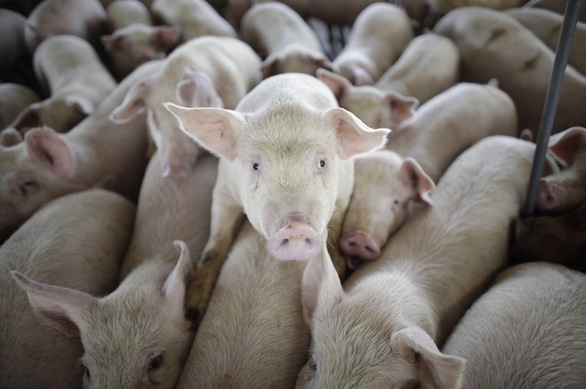Let’s say you’re the CEO of a factory pork producer. Your top priority is squeezing profits out of pigs. But there’s a downturn in the market. There’s more supply than demand for pork products, which means prices have fallen so low that you can’t charge enough to make the profit you promised your board of directors and shareholders.
Is it time to worry? Sign FDN's petition and help stop government pork for factory pork
Sign FDN's petition and help stop government pork for factory pork
Not likely. Because under the current system, sanctioned by the U.S. Department of Agriculture, there are two things you can do to boost your business:
(1) Ask the USDA for a low-interest loan to build a new production facility so you can raise even more pigs and release even more pork on an already oversaturated market.
(2) Ask the government to buy the excess pork, which you can’t sell to your usual buyers, and channel it into tax-payer supported nutrition programs like the National School Lunch Program.
This “pork for pork” policy is the latest target of Food Democracy Now (FDN), an advocacy organization made up of, in their words, “farmers, writers, chefs, eaters and policy advocates who recognize the profound sense of urgency in creating a new food system that is capable of meeting the changing needs of American society as it relates to food, health, animal welfare and the environment.”
Currently on FDN’s website is a petition and letter to Department of Agriculture secretary Tom Vilsack, asking him to “End the Factory Farm Bailout – Stop Government Pork.” They are asking you to add your name to the petition and then forward it to anyone else who may sign it. Here’s the entire text:
Dear Secretary Vilsack,
We are requesting that USDA suspend all loans to specialized hog and poultry facilities. USDA is currently guaranteeing loans to new production facilities, which contribute to over-supply in an already saturated marketplace. At the same time, USDA is using taxpayer dollars for bonus pork and poultry buys in order to stabilize prices resulting from overproduction. (In 2009 alone, the USDA committed to over $151 million bonus pork purchases, including in May when the industry asked for an additional $50 million pork buy and the most recent September purchase of $30 million additional pork for federal food and nutrition assistance programs.)
The use of USDA loan programs for new specialized hog and poultry facilities is an irresponsible use of taxpayer dollars.
When similar situations occurred in the past, USDA suspended the use of loan programs for the construction of these specialized facilities to ensure that the Agency did not continue to contribute to the overproduction situation.
In a January 8th, 1999 explanation of why USDA was suspending loans to specialized hog facilities, FSA says:
"It is inconsistent with USDA policies for FSA to continue to finance construction of additional production facilities through direct loans and loan guarantees while other agencies within USDA expend resources to ameliorate over-supply conditions."
-- Federal Register-January 1999
Continuing overproduction in both the hog and poultry industries are resulting in long-term depression of producer prices, closing of pork plants, canceling of poultry contracts, integrator requests for government assistance and further concentration of markets. All the while, USDA continues to make loans that further exacerbate the problem.
For these reasons:
We call for USDA to suspend all direct or guaranteed farm ownership or operating loans for the construction or expansion of specialized hog or poultry production facilities. I hereby add my name:
FDN summarized its position this way:
"Taxpayers should not be asked to foot the bill for factory farms. This is not a responsible use of taxpayer dollars and it needs to end!"
And:
"It’s time to stand up for family farmers and this is a good start."
Do you agree? Add your comment, below, and tell us if government subsidies for factory pork producers are harmful to smaller, family farms.



